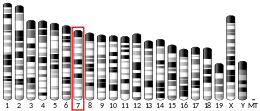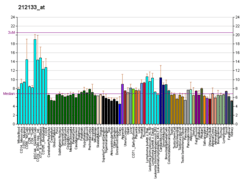NIPA2
Non-imprinted in Prader-Willi/Angelman syndrome region protein 2 is a protein that in humans is encoded by the NIPA2 gene.[5][6]
References
- 1 2 3 GRCh38: Ensembl release 89: ENSG00000140157 - Ensembl, May 2017
- 1 2 3 GRCm38: Ensembl release 89: ENSMUSG00000030452 - Ensembl, May 2017
- ↑ "Human PubMed Reference:".
- ↑ "Mouse PubMed Reference:".
- ↑ Chai JH, Locke DP, Greally JM, Knoll JH, Ohta T, Dunai J, Yavor A, Eichler EE, Nicholls RD (Sep 2003). "Identification of four highly conserved genes between breakpoint hotspots BP1 and BP2 of the Prader-Willi/Angelman syndromes deletion region that have undergone evolutionary transposition mediated by flanking duplicons". Am J Hum Genet. 73 (4): 898–925. doi:10.1086/378816. PMC 1180611. PMID 14508708.
- ↑ "Entrez Gene: NIPA2 non imprinted in Prader-Willi/Angelman syndrome 2".
Further reading
- Bittel DC, Kibiryeva N, Butler MG (2006). "Expression of 4 genes between chromosome 15 breakpoints 1 and 2 and behavioral outcomes in Prader-Willi syndrome". Pediatrics. 118 (4): e1276–e1283. doi:10.1542/peds.2006-0424. PMID 16982806.
- Gerhard DS, Wagner L, Feingold EA, et al. (2004). "The status, quality, and expansion of the NIH full-length cDNA project: the Mammalian Gene Collection (MGC)". Genome Res. 14 (10B): 2121–2127. doi:10.1101/gr.2596504. PMC 528928. PMID 15489334.
- Lefèvre C, Bouadjar B, Karaduman A, et al. (2005). "Mutations in ichthyin a new gene on chromosome 5q33 in a new form of autosomal recessive congenital ichthyosis". Hum. Mol. Genet. 13 (20): 2473–2482. doi:10.1093/hmg/ddh263. PMID 15317751.
- Glinsky GV, Glinskii AB, Stephenson AJ, et al. (2004). "Gene expression profiling predicts clinical outcome of prostate cancer". J. Clin. Invest. 113 (6): 913–923. doi:10.1172/JCI20032. PMC 362118. PMID 15067324.
- Ota T, Suzuki Y, Nishikawa T, et al. (2004). "Complete sequencing and characterization of 21,243 full-length human cDNAs". Nat. Genet. 36 (1): 40–45. doi:10.1038/ng1285. PMID 14702039.
- Strausberg RL, Feingold EA, Grouse LH, et al. (2003). "Generation and initial analysis of more than 15,000 full-length human and mouse cDNA sequences". Proc. Natl. Acad. Sci. U.S.A. 99 (26): 16899–16903. doi:10.1073/pnas.242603899. PMC 139241. PMID 12477932.
- Andersson B, Wentland MA, Ricafrente JY, et al. (1996). "A "double adaptor" method for improved shotgun library construction". Anal. Biochem. 236 (1): 107–113. doi:10.1006/abio.1996.0138. PMID 8619474.
This article is issued from
Wikipedia.
The text is licensed under Creative Commons - Attribution - Sharealike.
Additional terms may apply for the media files.





